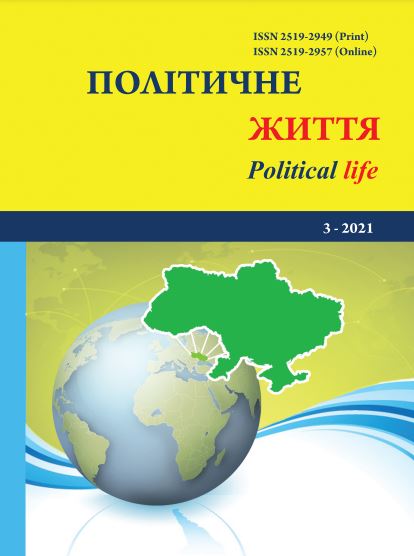Gender Aspects of Higher Education in Political Science Communities in Ukraine and Moldova
DOI:
https://doi.org/10.31558/2519-2949.2021.3.9Keywords:
gender; regions of Ukraine; Moldova; history of political science; discrimination; patriarchyAbstract
The article is devoted to revealing the gender aspects of higher education in political science communities in Ukraine (Lviv, Kharkiv, Simferopol) and Moldova (Chisinau) during 2012-2013. This work is a part of a larger study which captures the state of Ukrainian political science during 2012– 2013 and provides a better understanding of the political, social, ethnic, economic, gender and disciplinary views of students on the eve of the Revolution of Dignity. The empirical basis of this article is a survey of the students enrolled in three types of academic program (bachelor’s, specialist’s and master’s degrees) at four universities: Ivan Franko National University of Lviv, V. N. Karazin Kharkiv National University, V. I. Vernadsky Taurida National University and Moldova State University.
The answers of the respondents allow to reveal several tendencies. Firstly, male and female students often face various forms of discrimination during their last years of study. Secondly, the percentage of female students who have faced various forms of discrimination in academia is higher than that of male students. Thirdly, it should be noted that in the vast majority of cases respondents report the individual nature of the discrimination they directly perceive, although the data may differ depending on the region and gender. Finally, male and female students were most often discriminated against on political grounds, which is probably understandable given the specialty, location and timing of the survey.
In the final part of the article it is concluded that in Ukrainian and Moldovan Academy the basic student level provides a better attitude to women than to men. Given that far more male students than female students agree with this statement, we can interpret this trend as a manifestation of patriarchy. That is, when female students do not see a better attitude but male students do, we are dealing with a hidden source of conflict.
References
Вища освіта в Україні. Демографічна та соціальна статистика / Освіта. Державна служба статистики України. URL: http://ukrstat.gov.ua/ (дата звернення: 11.05.2021)
Дідух Г. Я. Формування іміджу жінки-політичного лідера : автореф. дис. … канд. політ. наук : 23.00.02. Київ, 2010. 20 с.
Журженко Т. Гендерные рынки Украины: политическая экономия национального строительства. Вильнюс: ЕГУ, 2008. 256 с.
Катан О. І. Концептуальні й політико-практичні засади вирішення ґендерної проблеми в Україні : автореф. дис. … канд. політ. наук : 23.00.02. Київ, 2005. 19 с.
Літвін Л. А. Особливості ґендерних досліджень у політичній науці. Політологічні записки. 2013. № 7. URL: http://nbuv.gov.ua/UJRN/Polzap_2013_7_18 (дата звернення: 19.06.2021).
Осін В. Українська політологія в період фемінізації: боротьба «за» та «проти» патріархатної епістеми. Політичне життя. Вінниця, 2018. №4. С.44–51. DOI: 10.31558/2519-2949.2018.4.7.
Осин В. Наука в новом мире: Три сюжета генезиса региональной политологии в постсоветской Украине. Ab Imperio. Studies of New Imperial History and Nationalism in the Post-Soviet Space. 2015. №. 4. С. 239–293. DOI:10.1353/imp.2015.0085
Осин В., Зеленски А., Шуляк С. Власть и знание на постсоветском пространстве: политический режим, научная степень, идеология и карьера в Украине и Молдове. Вильнюс, 2014. 376 с.
Пірен М. Ґендерні аспекти державної служби : монографія. Київ: «Основи», 2002. 335 с.
Rothman S., Kelly-Woessner A., Woessner M. The Still Divided Academy: How Competing Visions of Power, Politics, and Diversity Complicate the Mission of Higher Education. Rowman & Littlefield Publishers, 2011. 282 p.

